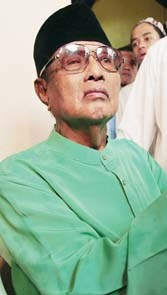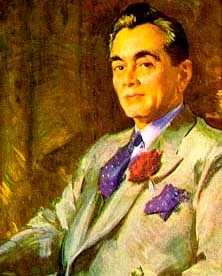EVEN though foreign insurgents make a historical claim to Sabah, the facts of history refute it.
AS Malaysian troops and police continue mopping-up operations to flush out straying remnants of the Lahad Datu standoff, partisans on both sides trade emotive claims and insults.
Analysts, meanwhile, weigh the terms in historical documents like “rent”, “lease” and “cession money” to determine Sabah’s actual status. But not only are these documents read differently in translation (English and Sulu), the terms are also interpreted differently.
It makes more sense to focus on the events and circumstances of history. The known facts reveal at least 16 reasons why the Filipino Sulu claim to Sabah is unwarranted and unworthy of consideration.
First, today’s Philippines as a modern nation state and a republic by definition abrogates a former sultanate whose territory it occupies and whose sovereignty it denies.
The Republic of the Philippines has no claim to Sabah of its own. The on-off claim, originating from Sulu sovereignty made by certain quarters, is only a private matter of some revisionist individuals.
The second reason is that the Sulu Sultanate no longer exists, since there  was no provision even for a constitutional monarch. Any claim requires a claimant and the property/territory in question, whether anyone else has effective control and ownership over it. If the claimant or the territory does not exist, the claim cannot stand.
was no provision even for a constitutional monarch. Any claim requires a claimant and the property/territory in question, whether anyone else has effective control and ownership over it. If the claimant or the territory does not exist, the claim cannot stand.
 was no provision even for a constitutional monarch. Any claim requires a claimant and the property/territory in question, whether anyone else has effective control and ownership over it. If the claimant or the territory does not exist, the claim cannot stand.
was no provision even for a constitutional monarch. Any claim requires a claimant and the property/territory in question, whether anyone else has effective control and ownership over it. If the claimant or the territory does not exist, the claim cannot stand.
The insurgents and their leader Jamalul Kiram III (right) are only pressing a notional claim, since they cannot represent a defunct entity.
Third, there is no agreed rightful heir to the last Sultan of Sulu, even if an heir were to press the claim. Jamalul’s claim to be that heir is disputed by nearly a dozen other hereditary “royal” personages.
Another reason for rejecting his claim to Sabah comes with denial of his claim to the throne: 10 other “heirs” had renounced all claim to Sabah in 2007. Nine did so in a signed statement, and Rodinood Julaspi Kiram II in a separate declaration.
It does not matter whether Jamalul was among the nine. If he was, he had unlawfully reneged on the signed agreement, and if he wasn’t, he is outnumbered and is challenged 10 ways.
Fifth, when Spain took over the Sulu Sultanate as part of the Philippines, it left North Borneo (Sabah) in British hands. Spain disrupted the Sultanate by removing 18-year-old Sultan Jamalul Kiram II in 1886, replacing him with a rival, only to “reappoint” him six years later.
Britain made North Borneo a protectorate in 1888. Under Spain, the Philippines and most of the Sulu Sultanate with it were going in one direction, while North Borneo and the British went in another.
Eventually, the sultanate was divested of political and administrative powers until it exercised authority only over religious matters. No effective, functioning sultanate existed any more.
Sixth, the death of Sultan Jamalul Kiram II in 1936 saw no successor, since he died childless. His younger brother and anointed successor, Mawalil Wasit, died the same year before he was crowned.
Thus ended the Royal House of Sulu’s lineage. After Spain passed the Philippines, including the territory of the former sultanate (excluding North Borneo) to the United States, the US officially abolished what remained of the sultanate in 1936.
Eighth, the British North Borneo Company also ceased payment to the sultanate that year, indicating that the business sector had considered the 1878 agreement voided. (Payment later resumed only after relatives of the deceased sultan brought the matter to court.)
 Ninth, President Manuel L. Quezon (left) of the (then) Commonwealth of the Philippines declared in 1936 that Jamalul Kiram II was the last Sultan of Sulu. To emphasise the point, Quezon said the Philippine government would no longer recognise a Sulu Sultanate.
Ninth, President Manuel L. Quezon (left) of the (then) Commonwealth of the Philippines declared in 1936 that Jamalul Kiram II was the last Sultan of Sulu. To emphasise the point, Quezon said the Philippine government would no longer recognise a Sulu Sultanate.
Britain had been exercising increasing proprietary moves over North Borneo, earning two rebukes from the US (1906, 1920). Britain ignored those reminders and annexed North Borneo in 1946, turning it into a crown colony.
Whatever the moral issues there, it again spelled the end of any vestige of Sulu royalty. For London, it was a justifiable move since it had taken over all the legal obligations of North Borneo.
Tenth, there was no question later (in the 1960s) about Sabah having to obtain independence from Britain. This underlined the fact that Britain was the sole governing authority up to that point.
Then as Sabah’s independence and the Cobbold Commission’s findings led to the scheduled formation of Malaysia on August 31, 1963, agitation flared from the Philippines. The date was postponed to September 16, such that Sabah was an independent entity for 16 days, ending any remaining claim from an extinct sultanate or the Philippines as belonging to it.
Twelfth, the very act of freely becoming part of the Malaysian federation negated all further claims on the territory by foreign partisans. The new state of Malaysia in its present form is recognised in all international organisations, including the United Nations and ASEAN, of which the Philippines is also a member.
Although former President Marcos tried to retake Sabah in the 1960s, the claim was later abandoned. At the Second Asean Summit in Kuala Lumpur in 1977, Marcos declared that the Philippines was taking concrete steps to end the claim.
Later, as Marcos’ rule clearly became a dictatorship, he made Punjungan Kiram “interim sultan” for Sulu. But this candidate ran off to Sabah, preferring to be a Malaysian instead.
Marcos then “appointed” Punjungan’s son Jamalul Kiram III successor to a non-existent sultan. This instigator of Lahad Datu is not only a dubious candidate since he is not the son of a sultan, but his claim to authority comes from a discredited and ousted dictator of a republic.
Not least, when President Corazon Aquino’s post-Marcos government  planned a new Philippine Constitution in 1987, Malaysia lobbied for wording to end the disturbing claim to Sabah for good.
planned a new Philippine Constitution in 1987, Malaysia lobbied for wording to end the disturbing claim to Sabah for good.
 planned a new Philippine Constitution in 1987, Malaysia lobbied for wording to end the disturbing claim to Sabah for good.
planned a new Philippine Constitution in 1987, Malaysia lobbied for wording to end the disturbing claim to Sabah for good.
This would replace “historical right or legal title” with “over which the government exercises sovereign jurisdiction” (i.e. the status quo), which was accepted after the third reading in Congress.
So for Philippine citizens to invade Sabah to lay claim to it clearly violates their country’s Constitution. President Benigno Aquino III’s prosecution of these criminals is fully in accordance with the law.
It is also said that no rightful Filipino claim to Sabah exists because as a country, it had not consistently engaged in the activities of a de facto power there. Not only that, there has also been no consistent Filipino claim to Sabah.



No comments:
Post a Comment
Note: Only a member of this blog may post a comment.